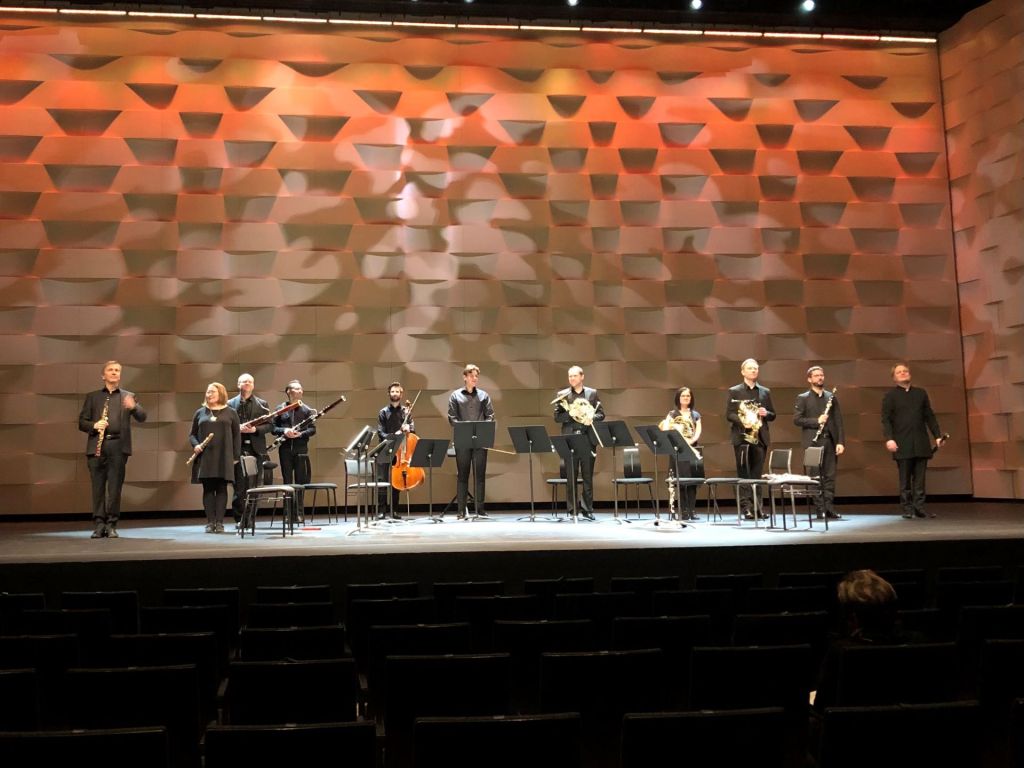
Making their guest appearance in Hauho Music Festival’s concert series at Verkatehdas in Hämeenlinna on Monday, the members of the Finnish Radio Symphony Orchestra brought to town top-tier performances of two very special musical works – that is to say the Finnish premiere of Thomas Adès’s exquisite basset clarinet quintet Alchymia (2021) and Antonín Dvořák’s uplifting Serenade, op. 44 (1878) for wind instruments, violoncello and double bass.
Priming Adès’s return to guest-conduct the FRSO proper in a programme of his own Purgatorio (2019-20) and Paradiso (2019-20) as well as Sibelius’s Fourth Symphony (1910-11) at the Helsinki Music Centre on Friday, Alchymia presented the Hämeenlinna audience with one of the composer’s most pristine scores, mastered to the finest detail by Christoffer Sundqvist, basset clarinet, Petri Aarnio and Emma Mali, violins, Jakob Dingstad, viola and Tomas Nuñez, cello.
Cast in four movements, the twenty-five-minute Alchymia is awash with connotations and allusions, musical and literary alike, ranging from the quintet’s Shakesperean opening to its Bergian close. The first movement, A Sea-Change …”those are pearls…”, recalls Ariel’s line from The Tempest (1610-11), evoking imagery from five fathoms deep, musing on the shipwrecked King’s eyes in their frozen gleam, thus aligning with – albeit not duplicating – Adès’s 2003-04 operatic setting of Shakespeare’s play in Meredith Oakes’s verse rendition.
A descending four-note motif is introduced by solo clarinet, setting the pianissimo textures on their gradually unfolding, adagio molto, con moto sereno trajectory. Subjected to modulations in meter, pitch and melodic shape, the clarinet line is echoed by its sting consorts, woven together with plucked lute impersonations, to an absorbing effect. Halfway into the five-minute movement, the fabric grows dexterously agitated, eventually dissolving into rallentando al fine coda in utmost delicate pppp dynamics.
Performed with remarkable sensitivity and finesse by the FRSO quintet, the opening movement unraveled in spell-like manner, taking hold on each and every listener, enchanting the audience with its sounding alchemy.
Cascades of airy arpeggio textures set The Woods So Wild second movement into incessant molto scorrevole, brillante motion. Interlocked into scintillating contrapuntal stream, the quintet draws its musical material from William Byrd’s 1590 theme and variations, conjuring up moonlit vistas of a woodland realm not far removed from that primordial realm visited by Sibelius in Tapiola (1926).
A three-minute study of ensemble virtuosity par excellence, navigated in style by the FRSO players, the movement stands in line with the micropolyphonic matrixes of György Ligeti’s Second String Quartet (1968) and Ten Pieces for Wind Quintet (1968), also recalling some of the seminal procedures of American Minimalism, while retaining its Schumannesque expressivity.
Alchymia’s pristine grave, intimissimo slow movement, Lachrymae, harks back to John Dowland’s 1600 lute song, thus joining Adès’s previous re-imaginings of the English Renaissance composer in Still Sorrowing (1992) and Darknesse Visible (1992). Here, the ebb and flow of the music is awash with chiaroscuro lyricism, wholeheartedly endorsed in the Verkatehdas performance, from the movement’s sky-high opening to its gripping touchdown.
Adès’s finale, Divisions on a Lute Song (Wedekind’s Round), is a multi-layered affair. As suggested by its title, the movement is builds upon a clarinet line from Alban Berg’s opera Lulu (1929-25), itself based on a Lautenlied from Franz Wedekind’s original play. Following his Byrdian lead, Adès takes the theme trough a series of variations – or divisions, to use the Renaissance term – lending the music an early-twentieth century aura, somewhat in the manner of his first opera Powder Her Face (1994-95). A bittersweet nine-minute miniature opera of almost cinematic vividness, performed with extraordinary sense of instrumental theatre, the full-scale musical imagination of the variation sequence was rendered with minutiae emotional nuance, bringing Alchymia to its moving close.

Scored for two oboes, two clarinets, two bassoons, three horns, cello and double bass, Dvořák’s Serenade is one of those absolute charmers in musical raiments, which never fail to lift up one’s spirits, especially when given in such wondrous outing as the FRSO line-up of Jorma Valjakka, Sanna Niemikunnas, Christoffer Sundqvist, Giuseppe Gentile, Otto Virtanen, Tuukka Vihtkari, Jukka Harju, Peter Janosi, Satu Huuskonen, Tomas Nuñez and Ilkka Harju.
Inspired by a performance of Wolfgang Amadeus Mozart’s Gran Partita, K. 361/370a (1781-82) by the Vienna Philharmonic Dvořák heard while in town in the fall of 1878, the Serenade was written within the space of two weeks after he had retuned from his travels. The twenty-five-minute Serenade is in four movements, opening with an upbeat Moderato, quasi marcia first movement, pre-echoing Miklós Rózsa with its gorgeous sonorous raiments. Tempo di minuetto ensues, combining Classicist sensibilities with Dvořák native Czech idioms, to beguiling effect. In the Andante con moto third movement, nocturnal tranquility and darker dreams merge, as we enter the very musical core of the Serenade. Rounding off with a polka-finale, marked Allegro molto, the score comes full circle, as Dvořák re-introduces material from the first movement, now in joyfully kinetic motion.
Ideally suited for smaller halls, such as the acoustically refined one at Verkatehdas, the Dvořák Serenade was beautifully served in performance by the FRSO players, who rendered the score in all its colorist splendor and melodic fluidity, demonstrating the art of ensemble performance at its finest.
Members of the Finnish Radio Symphony Orchestra
Thomas Adès: Alchymia (2021) for clarinet quintet (Finnish premiere)
Antonín Dvořák: Serenade for Wind Instruments, Violoncello and Double Bass, op. 44 (1878)
Hauho Music Festival, Verkatehdas, Hämeenlinna, Finland
Monday 18 March, 7 pm
© Jari Kallio
Leave a comment